|
Books Should Be Free Loyal Books Free Public Domain Audiobooks & eBook Downloads |
|
|
Books Should Be Free Loyal Books Free Public Domain Audiobooks & eBook Downloads |
|
Short Stories |
|---|
|
Book type:
Sort by:
View by:
|
By: James McKimmey (1923-) | |
|---|---|
 Planet of Dreams
Planet of Dreams
| |
 The Eyes Have It
The Eyes Have It
| |
 Celebrity
Celebrity
| |
 Pipe of Peace
Pipe of Peace
| |
 George Loves Gistla
George Loves Gistla
| |
By: James Oliver Curwood (1878-1927) | |
|---|---|
 Back to God's Country and Other Stories
Back to God's Country and Other Stories
| |
 Thomas Jefferson Brown
Thomas Jefferson Brown
| |
By: James R. Hall | |
|---|---|
 Am I Still There?
Am I Still There?
| |
By: James Stephens | |
|---|---|
 There is a Tavern in the Town
There is a Tavern in the Town
The soul of Irish wit is captured in this unique tale of a barstool philosopher, the concluding story from 'Here Are Ladies' by James Stephens. (Introduction by iremonger) | |
By: James V. McConnell (1925-1990) | |
|---|---|
 Life Sentence
Life Sentence
| |
By: Jane Eayre Fryer | |
|---|---|
 Mary Frances Story Book
Mary Frances Story Book
The Mary Frances Story Book is different from the other Mary Frances Books. They are part lessons and part story; they teach something about cooking and sewing, knitting and crocheting, housekeeping and gardening, and first-aid—and tell a story, too; but The Mary Frances Story Book is all story. On a summer afternoon Mary Frances took a holiday and sailed away across the blue water to an island—an island formed by the top of a coral mountain resting in a sea of blue; oh, so blue—a brighter blue than the water in your mother’s bluing tub—not the blue that makes you feel sad and blue, but the blue that makes you laugh with happiness... | |
By: Jennie Hall (1875-1921) | |
|---|---|
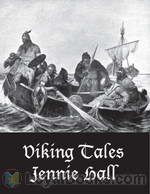 Viking Tales
Viking Tales
Viking tales are tales from Iceland, featuring the king Halfdan and his son Harald. | |
By: Jerome Bixby (1923-1998) | |
|---|---|
 Zen
Zen
| |
 Where There's Hope
Where There's Hope
| |
By: Jerome K. Jerome (1859-1927) | |
|---|---|
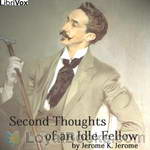 Second Thoughts Of An Idle Fellow
Second Thoughts Of An Idle Fellow
A second volume of humorous essays on various subjects, following the success of Idle thoughts Of An Idle Fellow. | |
 The Philosopher's Joke
The Philosopher's Joke
| |
 Sketches in Lavender, Blue and Green
Sketches in Lavender, Blue and Green
| |
 The Cost of Kindness
The Cost of Kindness
| |
 Passing of the Third Floor Back
Passing of the Third Floor Back
| |
 The Fawn Gloves
The Fawn Gloves
| |
 The Love of Ulrich Nebendahl
The Love of Ulrich Nebendahl
| |
 The Soul of Nicholas Snyders, or, The Miser of Zandam
The Soul of Nicholas Snyders, or, The Miser of Zandam
| |
 John Ingerfield and Other Stories
John Ingerfield and Other Stories
| |
 Mrs. Korner Sins Her Mercies
Mrs. Korner Sins Her Mercies
| |
By: Jesse F. Bone (1916-1986) | |
|---|---|
 The Issahar Artifacts
The Issahar Artifacts
| |
 Pandemic
Pandemic
| |
 A Question of Courage
A Question of Courage
| |
By: Jim Harmon (1933-2010) | |
|---|---|
 The Last Place on Earth
The Last Place on Earth
| |
 Measure for a Loner
Measure for a Loner
| |
 The Planet with No Nightmare
The Planet with No Nightmare
| |
By: Joe Archibald (1898-1989) | |
|---|---|
 Operation Earthworm
Operation Earthworm
| |
By: Joe L. Hensley (1926-2007) | |
|---|---|
 Now We Are Three
Now We Are Three
| |
By: Joel Chandler Harris (1848-1908) | |
|---|---|
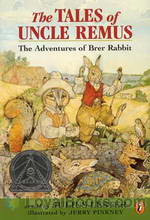 Uncle Remus
Uncle Remus
Bearing a striking resemblance to Aesop of Aesop's Fables fame, American author Joel Chandler Harris' Uncle Remus is also a former slave who loves to tell simple and pithy stories. Uncle Remus or to give it its original title, Uncle Remus: His Songs and His Sayings was published in late 1880 and received instant acclaim. The book was reviewed in hundreds of journals and newspapers across the country, leading to its immense success, both critical and financial. “Remus” was originally a fictional character in a newspaper column... | |
By: John Berryman (1919-1988) | |
|---|---|
 Vigorish
Vigorish
| |
By: John Buchan (1875-1940) | |
|---|---|
 The Moon Endureth: Tales and Fancies
The Moon Endureth: Tales and Fancies
| |
By: John Charles Dent (1841-1888) | |
|---|---|
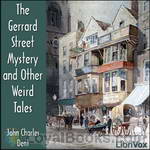 The Gerrard Street Mystery and Other Weird Tales
The Gerrard Street Mystery and Other Weird Tales
John Charles Dent, the author of the following remarkable stories, was born in Kendal, Westmorland, England, in 1841. His parents emigrated to Canada shortly after that event, bringing with them, of course, the youth who was afterwards to become the Canadian author and historian. Mr. Dent received his primary education in Canadian schools, and afterwards studied law, becoming in due course a member of the Upper Canada Bar. He only practised for a few years, then returned to England to pursue a literary career, writing mostly for periodicals... | |
By: John Cory | |
|---|---|
 Egocentric Orbit
Egocentric Orbit
| |
By: John D. Beresford (1873-1947) | |
|---|---|
 The Psychical Researcher's Tale - The Sceptical Poltergeist
The Psychical Researcher's Tale - The Sceptical Poltergeist
| |
By: John De Courcy | |
|---|---|
 Foundling on Venus
Foundling on Venus
| |
By: John Foster West (1919-2008) | |
|---|---|
 Cogito, Ergo Sum
Cogito, Ergo Sum
| |
By: John Fox (1863-1919) | |
|---|---|
 Hell Fer Sartain and Other Stories
Hell Fer Sartain and Other Stories
| |
By: John Galsworthy (1867-1933) | |
|---|---|
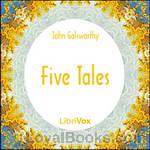 Five Tales
Five Tales
This 1918 book consists of five short stories or novelettes by Galsworthy. They are The First and Last (1914), A Stoic, The Apple Tree (1916), The Juryman, Indian Summer of a Forsyte (1918) This last became part of the trilogy The Forsyte Saga. (Introduction by David Wales) | |
 Villa Rubein, and other stories
Villa Rubein, and other stories
| |
 Captures
Captures
Brief plot lines of these 16 stories by Nobel Prize winning author John Galsworthy: 01, 02, 03 "A Feud" The breaking of an engagement ignites a feud. 04 "The Man Who Kept His Form" Ruding’s financial prospects disappoint. He adjusts. 05 "A Hedonist" Still single at 55, Vaness declares his love to a woman, 26. 06 "Timber" Hirries takes a celebratory afternoon walk in his forest. 07 "Santa Lucia" Old Trevillian recalls a past attraction begun at a casino. 08 "Blackmail" Money given to a needy woman leads to a blackmail threat... | |
By: John Kendrick Bangs (1862-1922) | |
|---|---|
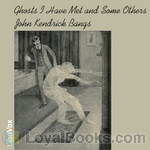 Ghosts I Have Met and Some Others
Ghosts I Have Met and Some Others
New York-born John Kendrick Bangs was associate editor and then editor of Life and Harper magazines, eventually finding his way into the Humour department. Here he began to write his own satire and humour. Ghosts I Have Met and Some Others is a delightfully humourous collection of short tales relating encounters with ghosts. | |
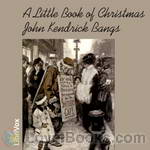 A Little Book Of Christmas
A Little Book Of Christmas
Summary: Four short Christmas stories, a bit sentimental, but still affecting and worthwhile. Plus Four Christmas verses. (Summary by David Wales) | |
 Over The Plum Pudding
Over The Plum Pudding
Great Caesar’s ghost and shades of A Christmas Carol! Stories – some ghostly, some Christmas, some humorous, some all three -- twelve of them by a master story teller and humorist of the late nineteenth and early twentieth centuries. | |
By: John O'Keefe | |
|---|---|
 As Long As You Wish
As Long As You Wish
| |
By: John Ruskin | |
|---|---|
 The King of the Golden River
The King of the Golden River
When three brothers mortally offend Mr. Southwest Wind, Esquire, their farm is laid waste and their riches lost. Desperate for money, the brothers become goldsmiths and melt down their remaining treasures . . . only to find that the spirit of the King of the Golden River resides with a molded tankard, and knows the secret of the riches of the Golden River. (Introduction by Xenutia) | |
By: John Strange Winter (1856-1911) | |
|---|---|
 Stories by English Authors: Germany
Stories by English Authors: Germany
| |
By: John T. Trowbridge (1827-1916) | |
|---|---|
 The Man Who Stole A Meeting-House 1878, From "Coupon Bonds"
The Man Who Stole A Meeting-House 1878, From "Coupon Bonds"
| |
By: John Victor Peterson | |
|---|---|
 Lost in the Future
Lost in the Future
| |
By: Joris-Karl Huysmans (1848-1907) | |
|---|---|
 Sac-Au-Dos 1907
Sac-Au-Dos 1907
| |
By: José Maria de Eça de Queirós (1845-1900) | |
|---|---|
 Our Lady of the Pillar
Our Lady of the Pillar
A ghost story and love story all at once, set in medieval Portugal. Don Ruy is in love with Dona Leonor, but her husband has guessed his feelings and hatches a plan. Don Ruy rides right into a trap, but on the way, a dead man joins him and saves his life. - Summary by Carolin | |
By: Joseph Addison (1672-1719) | |
|---|---|
 Essays and Tales
Essays and Tales
| |
By: Joseph Conrad | |
|---|---|
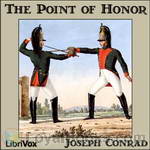 The Point of Honor
The Point of Honor
Set during the Napoleonic Wars, “The Point of Honor” (English title: “The Duel”) features two French Hussar officers, D’Hubert and Feraud. Their quarrel over an initially minor incident turns into a bitter, long-drawn out struggle over the following fifteen years, interwoven with the larger conflict that provides its backdrop. At the beginning, Feraud is the one who jealously guards his honor and repeatedly demands satisfaction anew when a duelling encounter ends inconclusively; he aggressively pursues every opportunity to locate and duel his foe... | |
 Tales of Unrest
Tales of Unrest
Tales of Unrest (1898) is the first collection of short stories by Joseph Conrad published in his lifetime.Joseph Conrad (1857–1924), a Polish-born English novelist, was a master in the formats of long short story and novella, a form of story longer than conventional short story but shorter than a novel. Some of Conrad's most acclaimed works have been written in these formats, most notably Heart of Darkness (1899).Tales of Unrest contains five stories; Karain: A Memory (written 1897; read by Jhiu), The Idiots (1896; read by Ann Boulais), An Outpost of Progress (1896; read by Kristine Bekere), The Return (1897; read by Raerity) and The Lagoon (1896; read by David Lazarus)... | |
 Within the Tides
Within the Tides
| |
 Tales Of Hearsay
Tales Of Hearsay
| |
By: Joseph Crosby Lincoln (1870-1944) | |
|---|---|
 Cape Cod Stories
Cape Cod Stories
This book (eleven short stories) was also published under the title of “The Old Home House”. Joseph Crosby Lincoln (1870 – 1944) was an American author of novels, poems, and short stories, many set in a fictionalized Cape Cod. Lincoln's work frequently appeared in popular magazines such as the Saturday Evening Post and The Delineator.... Lincoln claimed that he was satisfied "spinning yarns" that made readers feel good about themselves and their neighbors. Two of his stories have been adapted to film... | |